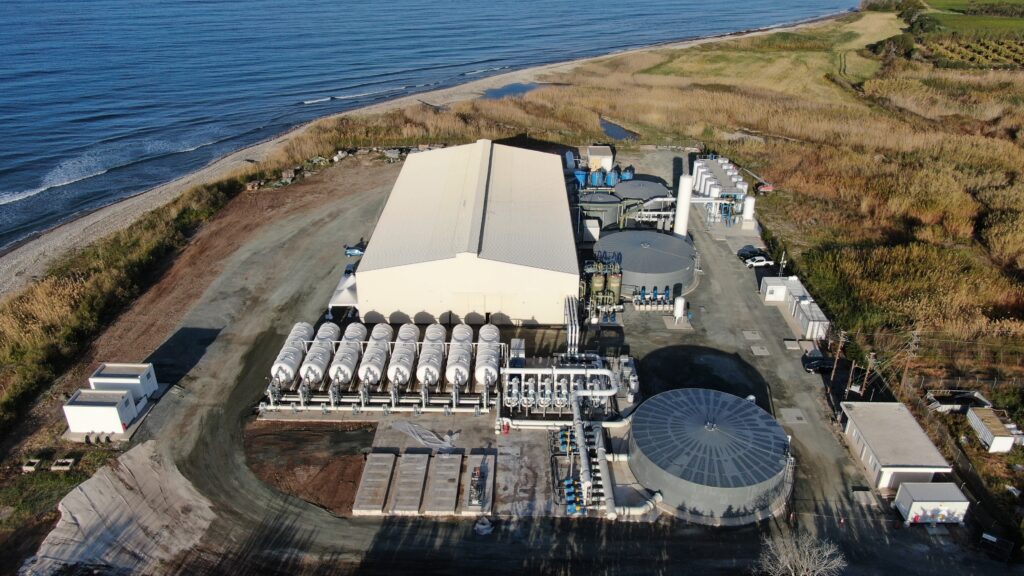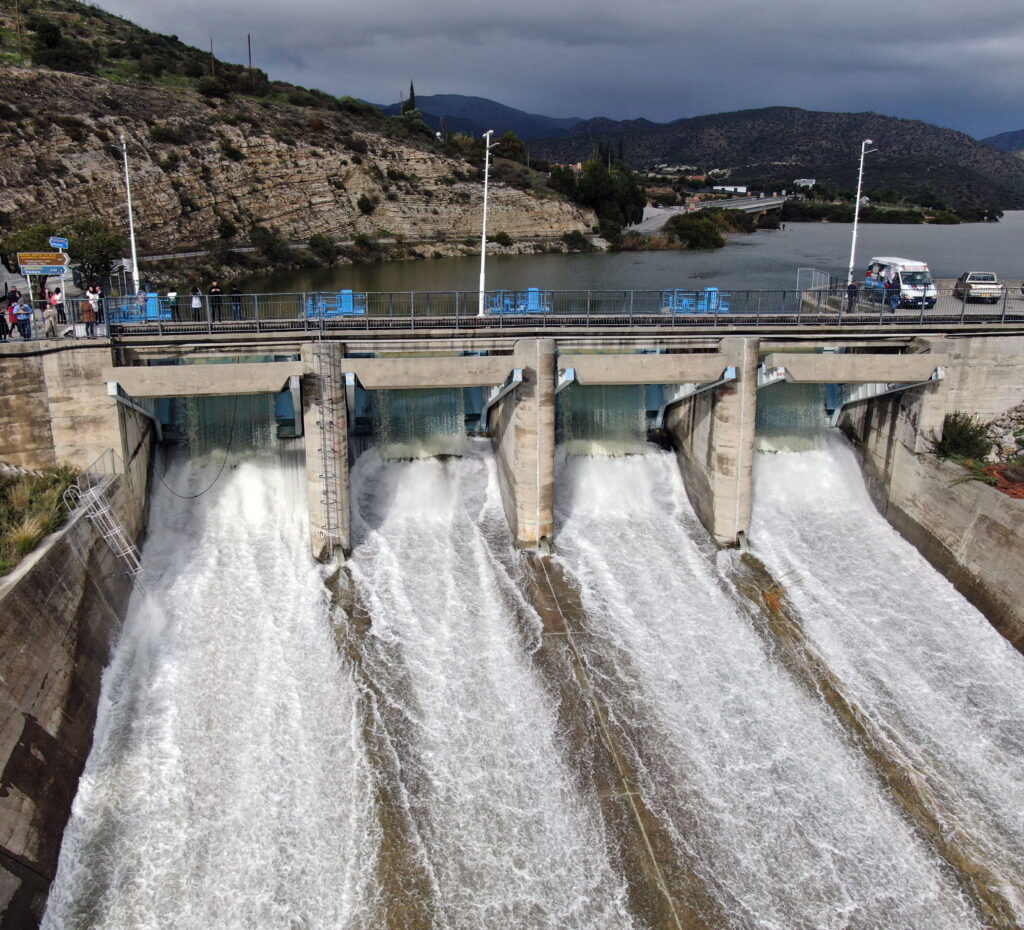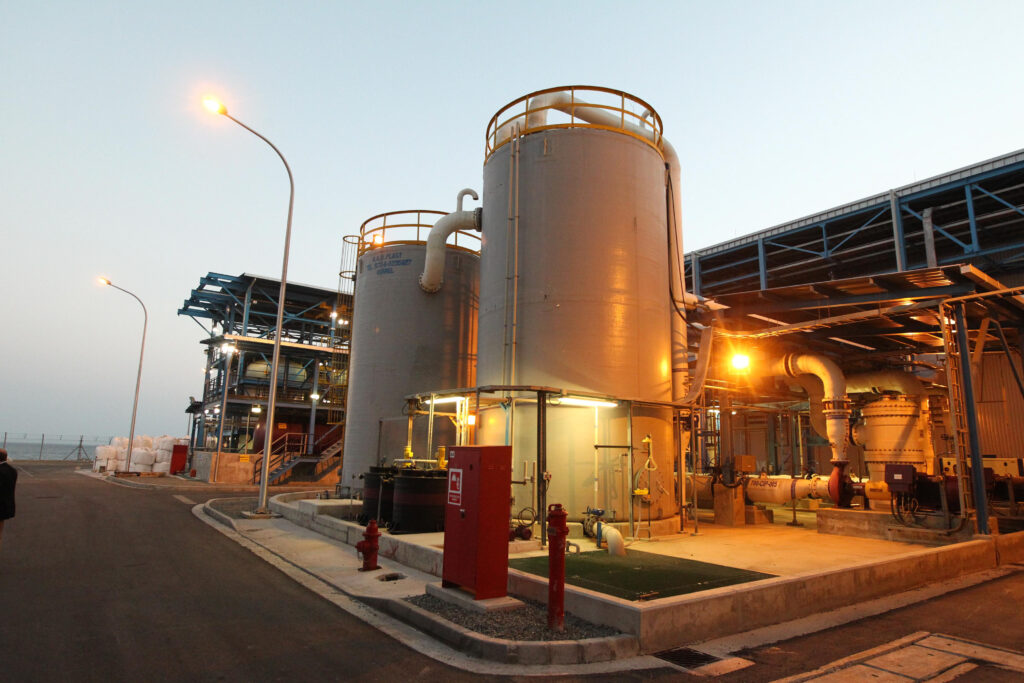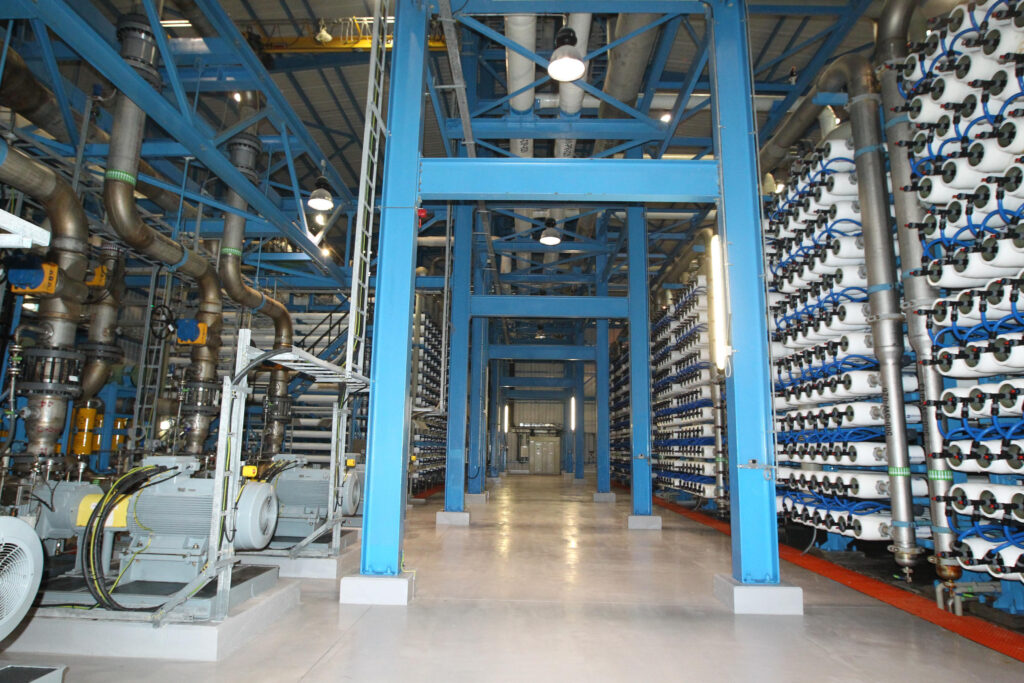Filenews 29 December 2024 - by Angelos Nicolaou
Next October, the new mobile desalination plants, three in the Limassol area and one in the Akamas area, are expected to provide the additional quantities of drinking water required to meet the existing needs. Mobile units are expected to be installed by March and the private operator of the plant in Kouklia, following the recent catastrophic fire at the plant, says it is estimated that the unit will be reopened by the summer.
Current water reserves are such that water supply for water supply may be threatened in 2025 and 2026 if inflows remain at average levels and appropriate measures are not taken for the rational allocation of available water resources for all uses.
The four mobile desalination plants with a capacity of 30,000 cubic meters (cubic meters) of water per day have a total cost of €66,400,000, of which €18,800,000 concern construction costs.
The Water Development Department is exploring other location options.
The first unit concerns the utilization of boreholes of the Limassol District Organization (EDA) in the Garyllis river bed for denitrification of brackish water with a capacity of 10,000 cubic meters per day with an estimated capital cost of €3,400,000.
The second unit is planned in the area of Limassol Port for sea water desalination and has a capacity of 5,000 cubic meters of water per day with the possibility of expansion to 10,000 and an estimated capital cost of €4,200,000.
A mobile unit is also planned at the EAC Station in Moni for desalination of sea water with a capacity of 10,000 cubic meters per day and an estimated capital cost of €6,700,000.
A fourth unit is planned near the Pafos Marina construction site for sea water desalination with a capacity of 5,000 cubic meters per day with the possibility of expansion to 10,000 and an estimated capital cost of €4,500,000.
Based on WDD estimates, for the total production of 41 million cubic meters of drinking water for the five-year period 2025-2030, the total investment cost of the four mobile units (including water purchase costs including operation and maintenance costs and energy costs) is estimated at €66.4 million.
It is noted that for the proposed installation sites of the four mobile desalination plants, there is an exception to the application of the provisions of the Environmental Impact Assessment from Certain Projects Law, while in parallel with the issuance of a Special Development Decree, mobile desalination plants, under specific conditions to be determined, will be exempted from the process of obtaining planning consent and will be considered licensed.
The immediate objectives of the WDD action plan are to increase the coverage of water supply needs by desalination plants from about 75% today to 80% to 85% and in the long term to 100%, while releasing quantities of water from dams for irrigation purposes.

This is how we will get cope without rainfall
With the completion of the ambitious program at the beginning of the next decade, the four existing units will be increased to six, with a larger capacity, which, in combination with the four mobile units, will reach a total of 510,000 cubic meters per day from 235,000 cubic meters per day today, covering 100% of drinking water needs for the coming decades.
Today, the five desalination plants in Dhekelia, Larnaka, Vasilikos, Episkopi Limassol and Paphos produce 235,000 cubic meters of drinking water per day. It is noted that the Paphos plant is temporarily out of operation following the fire that occurred on December 6, 2024.
Currently, the temporary increase of production at the Dhekelia desalination plant by 7,000 cubic meters per day is progressing. This increase, which was achieved with the cooperation of the contractor and the WDD without additional infrastructure, provided large additional and necessary quantities of water from last July until recently and is expected to be repeated in 2025.
The long-term actions aim at creating new infrastructure and upgrading existing ones, aiming at an annual increase in the water balance from €10 million. up to €40 million cubic meters of water.
At the same time, the construction of two new permanent desalination plants (Moni, Dhekelia) with a total capacity of 140,000 cubic meters per day and the possibility of expansion to 180,000 cubic meters per day is being promoted, while the WDD aims to locate one more unit.

Pressure due to urbanization and tourism
Development in Cyprus is mainly concentrated in coastal areas, as many residents move from rural to urban areas and tourism is constantly increasing. Development that requires large quantities of water for water supply, while at the same time, creates conditions for further expansion, increasing the need for water due to increased economic activity and new jobs that arise.
The total population of Cyprus is estimated to be approximately 920,000, of which 67% reside in urban areas. This percentage has remained relatively stable in recent years, indicating the strong urbanisation that characterises Cyprus' growth. The increase in the population living in urban centres has resulted in an increase in water demand from the Government Water Works of the South Pipeline, which serves Limassol, Nicosia, Larnaka and the free Famagusta district, and the Paphos Government Water Project.
At the same time, after 1974 and the Turkish invasion of the island, tourism showed a strong upward trend. In recent years, tourist arrivals remain at high levels, which leads correspondingly to an increase in the quantities of water available, especially during the summer months.
Also, in recent years there has been a general growth of the construction sector. The increased building development observed in recent years has resulted in significant pressures on both the environment and the natural resources of the island.
All this creates a development model that is expanding rapidly, significantly increasing the demand for water. This makes it difficult to balance water supply and demand and increases the risk of water scarcity in times of drought. The government is promoting the construction of new desalination plants as a solution to meet water needs, in line with the development model that is taking shape, with the need for new desalination plants becoming imperative, as the demand for water is expected to increase in the coming years due to climate change and economic growth.
Following an assessment of needs, the construction of at least two new desalination plants is proposed, while at the same time the upgrading of existing plants is promoted.
In relation to the upgrading of existing desalination plants, the possibility of upgrading the capacity of the Limassol (Episkopi) plant from 40,000 cubic meters per day to 60,000 cubic meters per day is being examined.
The WDD will proceed with the negotiation process with the contractor, while implementing the various preparatory studies required (Technical and Environmental Study, Feasibility and Economic Return Study, Project Note). The results of the negotiation will be put before the competent bodies for approval.
Regarding EAC's Vasilikos desalination plant, the water supply agreement with the Authority is expected to expire in July 2033. The WDD has discussed with EAC the possibility of increasing the capacity from 60,000 cubic meters to 70,000 cubic meters per day, with the construction of a small independent unit of 10,000 cubic meters next to the existing one.
For the Pafos desalination plant, at the request of the WDD, the possibility of gradually expanding its daily capacity from 15,000 cubic meters to 30,000 cubic meters is being considered.
In case it is deemed possible to increase the capacity of the plant, the WDD will negotiate with the contractor, while implementing the various preparatory studies required (Technical and Environmental Study, Feasibility and Economic Return Study, Project Note). The results of the negotiation will be put before the competent bodies for approval and then the process of concluding a relevant supplementary agreement with the Contractor will proceed.

In Moni and Dhekelia the new units
The construction of two new permanent desalination plants (Moni, Dhekelia) with a total capacity of 140,000 cubic meters per day and the possibility of expansion to 180,000 cubic meters per day is being promoted, while the WDD aims to locate one more unit.
In eastern Limassol, the WDD, taking into account the increased needs for drinking water supply in the greater Limassol area, promotes the construction of a new desalination plant with a capacity of 60,000 cubic meters per day and with the possibility of expansion by 20,000 cubic meters. After studying the wider area of interest between the Monastery and Vasilikos, the existing and under study developments and taking into account technical, economic, environmental and social criteria, a list of possible locations has been compiled.
First on the list and the prevailing solution is the EAC power station in Moni. EAC is positive and a working group has been set up to examine how to cooperate for the construction of the plant. It should be noted that this plot, due to the fact that it has been expropriated to EAC for a specific purpose, cannot be granted to the WDD, even with the agreement of EAC, for the construction of a desalination plant. The actions that can be taken are for EAC to proceed with the retention of the plot and change the purpose of its use, so as to add the construction of a desalination plant and then either for EAC to proceed with the construction and conclusion of an agreement with the WDD for the supply of water (as in the Vasilikos desalination plant) or to make an agreement between EAC and EAC for a long-term lease of the required land to the WDD (approved long-term lease with the right to renew), for the purpose of an open tender by the WDD for the construction of the self-financing desalination plant. Depending on the working group's proposals, further steps to be taken will be determined. It is noted that the construction of the permanent unit will be considered independently of the installation of the mobile unit, which is requested to be located also on the said plot.
A second alternative location is on land owned by the Holy Archdiocese of Cyprus, which, however, does not view the issue warmly. The consent of the Archdiocese has been requested for the expropriation of specific plots and a negative response has been received, due to the fact that these plots are subject to other legal and/or contractual commitments and obligations. It is noted that, according to Article 23, Paragraph 9 of the Constitution, parcels of church property cannot be expropriated without obtaining its prior consent.
As an alternative location, the energy and industrial area of Vasilikos is proposed. It is noted that the WDD applied to the Ministry of Commerce for the concession of the specific land, but received a negative response on the grounds that the construction of a desalination plant is not included in the permitted activities/facilities in the area of the Vasilikos Energy Center.
In addition, a new desalination plant is being promoted in Dhekelia near the existing plant, with a capacity of 60,000 cubic meters per day and with the possibility of expansion by 20,000 cubic meters per day. It is noted that the British Bases to which the land belongs expressed preliminary positive views and then a preliminary spatial plan was prepared. The Bases administration informed that there are no military objections to the request for lease of the plot for the construction of a new desalination plant.

They are looking for land in free Famagusta and Larnaca
In order to strengthen the Southern Pipeline Integrated Plan, a new desalination plant is being promoted which will contribute to the safety of water sufficiency, ensuring that the Larnaka/Famagusta area will be able to meet future challenges. The addition of this plant is considered vital for the stability of the water supply, reducing the risk of water scarcity and ensuring the smooth functioning of the local economy. In order to meet the growing needs of the Famagusta area, which includes both water supply and agricultural and tourist activities, it is necessary to build a new desalination plant. The area faces an ever-increasing demand for water, especially during the summer months, when tourist traffic peaks, significantly burdening existing water reserves.
Exploration has been carried out in various areas of both Larnaka and Famagusta districts in order to identify a suitable area of approximately 30,000 square meters for the construction of the new desalination plant with a capacity of 60,000 cubic meters per day and with the possibility of expansion by 20,000 cubic meters. When assessing the areas, criteria such as the availability of state land, which must be sufficient for the installation, as well as the location in a zone where the construction of desalination plants is allowed, were taken into account. In addition, priority was given to areas located as close as possible to the WDD pipeline networks, to ensure the efficient connection and operation of the plant.
The specific locations of the plant examined have the advantage of flexibility in more efficient water management, satisfying the needs of Nicosia but also of Larnaka and Famagusta. The possible location sites that have been examined are in Mazotos and Psematismenos.
For Mazotos, the assignment of state land by the WDD has been requested, while for Psematimenos the assignment of state land that was used for the purposes of the Ministry of Defense and has been released is being examined.
At the same time, the WDD is considering the construction of a new desalination plant in the Free District of Famagusta. According to the maritime spatial plan, it is noted that a large part of the study area is characterized by various zones such as bathing and recreation zone, recreational craft infrastructure zone, Natura 2000 network area, within which it is not possible to install the marine pipeline of the desalination plant. In addition, large developments are located in the study area, which make it even more difficult to find space for the construction of the unit. Nevertheless, the study for finding alternative sites in the area of interest continues, in cooperation with all involved Services.
